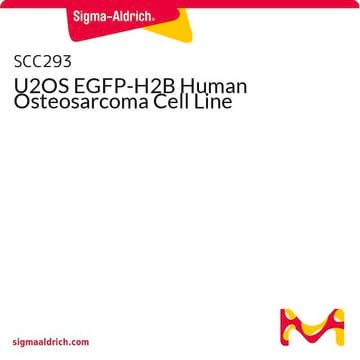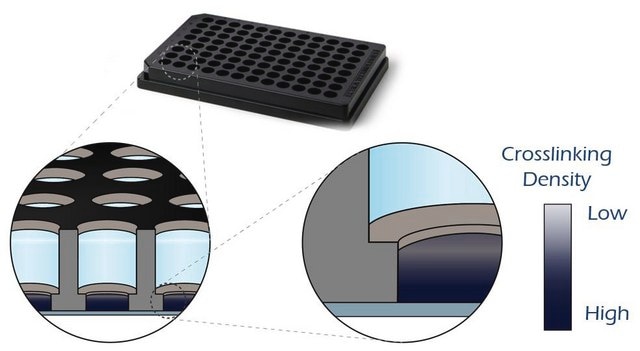CLL1038
U2OS BFP-LMNB1 RFP-ACTB
human female bone (Disease source: Osteosarcoma)
Sign Into View Organizational & Contract Pricing
All Photos(4)
About This Item
UNSPSC Code:
41106514
NACRES:
NA.81
Recommended Products
product name
U2OS BFP-LMNB1 RFP-ACTB,
biological source
human female bone (Disease source: Osteosarcoma)
storage temp.
−196°C
Gene Information
human ... ACTB(60) , LMNB1(4001)
General description
This product was derived from ATCC Cat. No. HTB-96.
U2OS BFP-LMNB1 RFP-ACTB are osteosarcoma, epithelial cells, from a human caucasian female (aged 15 years), with BFP-tagged and RFP-tagged modifications.
U2OS BFP-LMNB1 RFP-ACTB are osteosarcoma, epithelial cells, from a human caucasian female (aged 15 years), with BFP-tagged and RFP-tagged modifications.
Application
This product is a human U2OS cell line in which the genomic LaminB1 gene has been endogenously tagged with a Blue Fluorescent Protein (BFP) and the genomic ACTB gene has been endogenously tagged with a Red Fluorescent Protein (RFP) gene using CompoZr® Zinc Finger Nuclease technology. Integration resulted in endogenous expression of a fusion protein in which BFP is attached to the N-terminus of LaminB1 and of a fusion protein in which RFP is attached to the N-terminus of actin. Fluorescence imaging shows the characteristic LaminB1 nuclear expression and that the actin can polymerize to form the characteristic pattern of actin filaments. This stable cell line was expanded from a single clone. The target′s gene regulation and corresponding protein function are preserved in contrast to cell lines with overexpression via an exogenous promoter.
To learn more, please visit the Cellular Reporter Cell Line webpage
Features and Benefits
LMNB1 is BFP-tagged on chromosome 5q23.3-q31.1 and ACTB is RFP-tagged on chromosome 7p22.1.
U2OS cells are adherent, with a doubling time of approx. 29 hours.
U2OS cells are adherent, with a doubling time of approx. 29 hours.
Components
U2OS BFP-LMNB1 RFP-ACTB cells
Quality
Tested for Mycoplasma, sterility, post-freeze viability, short terminal repeat (STR) analysis for cell line identification, and PCR assay for cell line species confirmation.
Preparation Note
Media Renewal changes two to three times per week.
Rapidly thaw vial by gentle agitation in 37°C water bath (~2 minutes), keeping vial cap out of the water. Decontaminate with 70% ethanol, add 9 mL culture media and centrifuge 125 x g (5-7 minutes). Resuspend in complete culture media and incubate at 37°C in a 5% CO2 atmosphere.
Subculture Ratio: approx. 1:3-1:6
The base medium for this cell line is McCoy′s 5A1 Medium Modified, Cat. No. M9309. To make the complete growth medium, add the following components to the base medium: fetal bovine serum, Cat. No. F4135, to a final concentration of 10%.
The cell freezing medium is DMSO 1X (Cat. No. C6164).
Rapidly thaw vial by gentle agitation in 37°C water bath (~2 minutes), keeping vial cap out of the water. Decontaminate with 70% ethanol, add 9 mL culture media and centrifuge 125 x g (5-7 minutes). Resuspend in complete culture media and incubate at 37°C in a 5% CO2 atmosphere.
Subculture Ratio: approx. 1:3-1:6
The base medium for this cell line is McCoy′s 5A1 Medium Modified, Cat. No. M9309. To make the complete growth medium, add the following components to the base medium: fetal bovine serum, Cat. No. F4135, to a final concentration of 10%.
The cell freezing medium is DMSO 1X (Cat. No. C6164).
Legal Information
CompoZr is a registered trademark of Merck KGaA, Darmstadt, Germany
Disclaimer
RESEARCH USE ONLY. This product is regulated in France when intended to be used for scientific purposes, including for import and export activities (Article L 1211-1 paragraph 2 of the Public Health Code). The purchaser (i.e. enduser) is required to obtain an import authorization from the France Ministry of Research referred in the Article L1245-5-1 II. of Public Health Code. By ordering this product, you are confirming that you have obtained the proper import authorization.
Storage Class Code
10 - Combustible liquids
WGK
WGK 3
Flash Point(F)
Not applicable
Flash Point(C)
Not applicable
Certificates of Analysis (COA)
Search for Certificates of Analysis (COA) by entering the products Lot/Batch Number. Lot and Batch Numbers can be found on a product’s label following the words ‘Lot’ or ‘Batch’.
Already Own This Product?
Find documentation for the products that you have recently purchased in the Document Library.
Our team of scientists has experience in all areas of research including Life Science, Material Science, Chemical Synthesis, Chromatography, Analytical and many others.
Contact Technical Service





